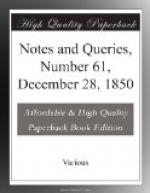Dr. Bowring’s version,—though a good one, if the difficulty be considered of giving back a piece of poetry, whose every word is a poem in itself, and by whose rhyme and accentuation a feeling of indescribable awe is instilled into the most fastidious reader’s mind,—Dr. Bowring’s version is but a feeble reverberation of the holy fire pervading our Dutch poet’s anthem. But still there rests enough in his copy to give one a high idea of the original. I borrow the same Englishman’s words when I add:—
“The criticism that instructs, even though it instructs severely, is most salutary and most valuable. It is of the criticism that insults, and while it insults, informs not, that we have a right to complain.”—Batavian Anthology, p. 6.
JANUS DOUSA.
Manpadt House.
* * * * *{509}
A MYTH OF MIDRIDGE;
Or, A Story anent a witless
Wight’s Adventures with the Midridge
Fairies in the Bishoprick
of Durham; now more than two Centuries
ago.
Talking about fairies the other day to a nearly Octogenarian female neighbour, I asked, had she ever seen one in her youthful days. Her answer was in the negative; “but,” quoth she, “I’ve heard my grandmother tell a story, that Midridge (near Auckland) was a great place for fairies when she was a child, and for many long years after that.” A rather lofty hill, only a short distance from the village, was their chief place of resort, and around it they used to dance, not by dozens, but by hundreds, when the gloaming began to show itself of the summer nights. Occasionally a villager used to visit the scene of their gambols in order to catch if it were but a passing glance of the tiny folks, dressed in their vestments of green, as delicate as the thread of the gossamer: for well knew the lass so favoured, that ere the current year had disappeared, she would have become the happy wife of the object of her only love; and also, as well ken’d the lucky lad that he too would get a weel tochered lassie, long afore his brow became wrinkled with age, or the snow-white blossoms had begun to bud forth upon his pate. Woe to those, however, who dared to come by twos or by threes, with inquisitive and curious eye, within the bounds of their domain; for if caught, or only the eye of a fairy fell upon them, ill was sure to betide them through life. Still more awful, however, was the result if any were so rash as to address them, either in plain prose or rustic rhyme. The last instance of their being spoken to, is thus still handed down by tradition:—’’Twas on a beautifully clear evening in the month of August, when the last sheaf had crowned the last stack in their master’s hagyard, and after calling the “harvest home,” the daytale-men and household servants were enjoying themselves over massive pewter quarts foaming over with strong beer, that the subject of the evening’s




